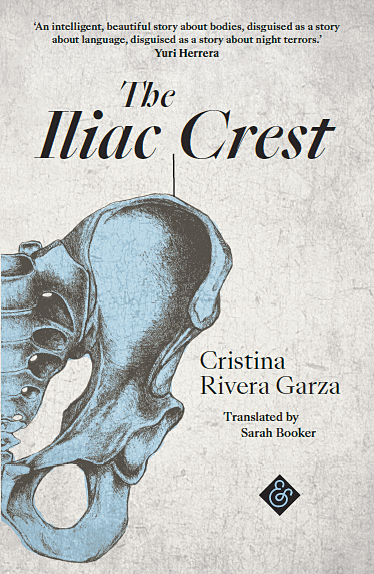The Iliac Crest – An unsettling tale of disappearance and mystery
This surreal novel from Mexican author Cristina Rivera Garza explores the nature of boundaries, in a haunted tale that sticks in the imagination.

In literature, disappearance tends to be a primarily active phenomenon, with individuals making the choice to leave their family and friends behind. While it is not necessarily a consensual act – ‘disappear’ implies people are left behind, who are often searching for the missing individual – the person who disappears generally does so of their own accord; from Gillian Flynn’s Gone Girl through to Alice Munro’s brilliant trio of short stories in her Runaway collection, literature is peppered with these tales of voluntary flight.
But then there is the phenomenon of disappearance as a passive phenomenon, which takes on a greater sense of darkness: the individual does not ‘disappear’, but rather they ‘are disappeared’. Implicit within this act is the notion of violence, of power, of horror. Mexican author Cristina Rivera Garza expertly mines this deep seam of the uncanny in her short novel The Iliac Crest, first published in Spanish in 2002, and now arriving in English with a translation by Sarah Booker. Drawing on the boundaries between existence and absence, gender lines, and the fluid nature of borders, Rivera Garza has weaved a darkly-unsettling tale, which – though short – leaves a lasting impact on the reader.
The book centres on an unnamed narrator, living in a home by the sea, who works at a hospital for the dying, which he describes as “nothing more than a cemetery with open tombs.” One rainy night he receives a visit from two women: one is a figure from his past, struck down by a fever, while the other is Mexican author Amparo Dávilla, known for her gothic works which dwell on the fantastic and sinister. This Dávilla has been ‘disappeared’ – the real-life Dávilla is alive and well – which Rivera Garza describes as a form of physical contagion sweeping the unnamed country: “mechanisms triggering the disease vary quite a bit – a greater or lesser degree of violence, more or less isolation, a little or a lot of silence – but the common element among all of them is contact.”
“Rivera Garza has weaved a darkly-unsettling tale, which leaves a lasting impact on the reader”
This idea of being disappeared has a long history, particularly in Latin and Southern America, where regimes like Pinochet’s would regularly liquidate political opponents. While at the time of writing Rivera Garza was undoubtedly referencing the widely-publicised femicides occurring in Ciudad Juárez, today they evoke most strongly incidents like the 2014 Iguala mass kidnapping, during which 43 students were disappeared.
The disappeared Dávilla nurses the other woman back to health, and the two begin conspiring together in an unknown language, leaving the narrator helpless – “I could do nothing before their language. I could not infiltrate it.” They ask him to search the hospital’s records for a mysterious patient from the past, which could help them identify a lost manuscript of Dávilla’s. Rivera Garza evokes a sense of Kafkaesque nightmare in the hospital sequences, while also reminding me of the cool, clear horror of Shirley Jackson’s best work.
What sets Rivera Garza’s novel apart from other books which deal with similar moods of isolation and fear is the way she explores the idea of boundaries. The book takes place in an uncertain geography – references are made to a ‘North City’ and a ‘South City’, between which the hospital seems to be located, abutting a wide open sea. The narrator describes it as “the end of the world…this threshold where one state ended and the next was unable to begin.” The terrain of the earth is not the only uncertain aspect; the terrain of the body, and of gender, also proves to be malleable, with Rivera Garza exploring ambiguities in identity skillfully, although certain linguistic differences between Spanish and English limit this exploration somewhat. Those who are disappeared live “with one foot in the grave and the other on terrain that held only a remote resemblance to life”, existing in some kind of ethereal plane.
“Not only the terrain of the earth, but the terrain of the body also proves malleable”
Rivera Garza also powerfully writes about the force language, and its creation, can have. Faced with his interlocutors’ unfamiliar speech, the narrator ends up feeling “as if I were inside a parenthesis in a sentence written in an unknown language.” The manuscript of Dávilla’s must be found otherwise her “young followers won’t have the means to describe their own experiences on this earth.” The word, for Rivera Garza, is both a liberation and a form of power, which can both lift up and oppress.
Late in the novel, the narrator speaks of how staff at the hospital describe dying individuals as ‘patients’: “We dealt with people to whom we hadn’t yet found a sufficiently technical or neutral way to describe, without the weight of conscience, the underlying truth about our position: we were not doctors, but more or less efficient guardians of death.” This sense of horror lurking behind language infiltrates The Iliac Crest; it pervades deep into the bones of Rivera Garza’s words, settling deep into the very marrow of the novel.











